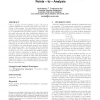24 search results - page 3 / 5 » Games Where You Can Play Optimally Without Any Memory |
LICS
2000
IEEE
13 years 10 months ago
2000
IEEE
We consider two-player games which are played on a finite state space for an infinite number of rounds. The games are concurrent, that is, in each round, the two players choose ...
ICMCS
2007
IEEE
14 years 14 days ago
2007
IEEE
Image based modeling and rendering techniques have become increasingly popular for creating and visualizing 3D models from a set of images. Typically, these techniques depend on v...
FOCS
2009
IEEE
14 years 28 days ago
2009
IEEE
In the classical balls-and-bins paradigm, where n balls are placed independently and uniformly in n bins, typically the number of bins with at least two balls in them is Θ(n) and ...
TIFS
2008
13 years 6 months ago
2008
In autonomous mobile ad-hoc networks, one major challenge is to stimulate cooperation among selfish nodes, especially when some nodes may be malicious. In this paper, we address co...
POPL
2003
ACM
14 years 6 months ago
2003
ACM
Given a program and two variables p and q, the goal of points-to analysis is to check if p can point to q in some execution of the program. This well-studied problem plays a cruci...


